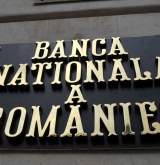2. Nevertheless, I think that something specific can be done in Romania, not only as damage limitation exercise but also in order to prepare the ground for a full participation of Romania in the recovery process when it will start.
I will address four crucial issues in my view:
a. the reputation deficit of Romania;
b. the budgetary policy;
c. the IMF and EU support;
d. the euro perspective.
a)- First, the reputational deficit.
Most of the time, Romania is included as a full member of a “sub-league” club of the countries which are considered as presenting high risks. This is done by market commentators, rating agencies and the international press.
In my view this is wrong, unjustified and detrimental for the Romanian economy. The problems of Romania are serious but Romania is better off than the other countries.
Just a few examples: The Romanian public debt is extremely low. The peak of the budgetary deficit has been nothing more the approximately 5% in 2008, which is well below about has been observed in other countries. The current account deficit is (too) high relatively well financed until now and below the level of the others.
The demonstration has been done that the growth potential is high in this country. The inflation performance is good if we accept the fact that the price increases in 2008 have essentially been determined by the world prices of energy and commodities.
Other arguments are certainly available. The unjustified bad reputation and wrong perception about the effective and specific situation of Romania has a cost. The exchange rate has been under pressure and now at a level which is not appropriate. The interest rates include a risk premium which has no logical economic and financial justification and creates problems for the financing of the national budget and the enterprises.
My conclusion is simple: the Romanian authorities should not accept without reaction the presentation that is frequently made about the economic situation of the country. Actions should be taken in order to give a more balanced (and positive) view of where Romania is and intend to go. It should NOT be propaganda or advertising exercise, but an honest and objective analysis. This should be done publicly and firmly as public relation exercise, involving all the Romanian institution and targeting the authors of the excessively negative judgments which are formulated.
b)- And now let’s talk about the budget.
In order to make a stronger case about Romania and to reverse the present negative trend in terms of perception there is an urgent need to give a strong and credible message about the outlook of the budgetary policy.
In my view, it would be necessary to revise, as soon as possible the present budget on the following basis:
- a GDP growth assumption of zero for 2009;
- an absolute ceiling for the budget deficit of maximum 3.5% of GDP;
- additional tax revenues of 1% of GDP, having unchanged the VAT and the flat tax rate;
- if the room is available, some new or additional expenditures and programmes to sustain technological innovation, enterprise creation and development through a public scheme for venture capital, energy savings measures. This is important for the future.
The implementation of these lines should bring the following benefits.
The budgetary policy will be considered as more credible. Today a growth assumption of 2.5% and a deficit of 2% of GDP are not. At the mean time, targeting a deficit of 3.5% as a maximum will give a clear message that the negative trend of 2008 will be reversed. But the commitment must be credible. This is why it is necessary, to be in the safe side, to increase tax revenues in areas like “health tax” (cigarettes and alcohol) excise duties on fuels and gasoline, taxes on luxury goods especially cars, for example.
The level of the targeted deficit, assuming that it is clearly below the 2008 level is less important that the determination of the Governmental commitment to achieve it.
c) -The Government and NBR have taken the right decision to start the necessary preparations and discussions in order to get the financial support of the IMF and/or the EU, associated with and agreed economic policy programme.
It is in the best interest of Romania to conclude this process as soon as possible. The expected agreement should be put in the right perspective and should not be perceived as an rescue operation.
My appropriate presentation should be the following: Romania has an clear view of what is necessary to do in the present circumstances. The adjustment programme which will be defined in Bucharest has the support of the IMF and European Union authorities. The financial support of the IMF and/or the EU will facilitate the adjustment programme, offering the necessary stability and predictability and reducing the cost of borrowing for the budget.
As soon as Romania will be perceived as being in line with the coordinated approach of these two institutions, I am confident that the significant improvements will be felt on the exchange rate and risk premium paid by Romania.
One important point has to be underlined: Romania is aware that corrective measures have to be taken but keeping in mind that in the present juncture some support has to be given to the internal demand. This sense of balance has to be kept in mind, on both sides of the negotiating table.
Romania should be able to convince its interlocutors on this point.
d) - Finally the euro issue.
Well before the eruption of the present crisis, the Governor of the Central Bank has rightly raised the issue of Romania entering in the euro area. I fully share and support his position. It should not seen today as an emergency issues in order just to protect Romania from an exchange rate instability. It is not a short term issue. But even if it is a medium term objective a credible approach to this objective will bring short term benefits. From my point of view it is essential that the Romanian Government declares this objective as a national one. In order to be consistent and credible, it must be said that Romania is determined to implement the economic policy measures which will allow the country to meet the conditions for joining the euro at the appropriate time.
Again, it is not and should not be perceived as an emergency measure like other countries have done.
After all, accession to the euro only requires policies and objectives which are positive for the Romanian economy: low inflation, sound budgetary policy, exchange rate stability and low interest rates.
The Government should state the broad guidelines and the steps for the policy credible leading to the euro. The internal and external confidence and reputation will be improved with the collateral benefits on the exchange rate, foreign investments and interest.
For the time being, there is no need for a detailed action plan. But the commitment must be a convincing one and should be based on the two following questions:
- Is Romania a full member of the internal market being outside the euro?
- Is the exchange rate an effective instrument of economic policy for Romania?
Two final and short remarks on issues which are important but at the margin of the macroeconomic scenarios which has been presented above.
First, in the present condition it is essential that Romania fully benefits from the potential support of the Structural Funds. From 2009 on, every single euro should be used for the development of the country. All the necessary measures should be taken to raise the absorption capacity of the country.
Second, there is a need to prepare the medium long term future and competitiveness of the Romanian economy. This is the way, even under the present restrictive conditions, the budget should include some measures to improve the productivity and efficiency of the Romanian economy especially in favor of small enterprises.
_____________________________________________________________________
The present article was written during the evaluation joint mission of CE and IMF in Romania.
Citeste si:
Calculator Salariu: Află câți bani primești în mână în funcție de salariul brut »
Te-ar putea interesa și:


















































































![HR [PLAY] Tech Workout - 11...](https://www.wall-street.ro/image_thumbs/thumbs/973/x973fe0a3888d417feff63de42e814180-260x260-00-65.jpg,qv=1714074246.pagespeed.ic.8JsqLrmwPf.jpg)









